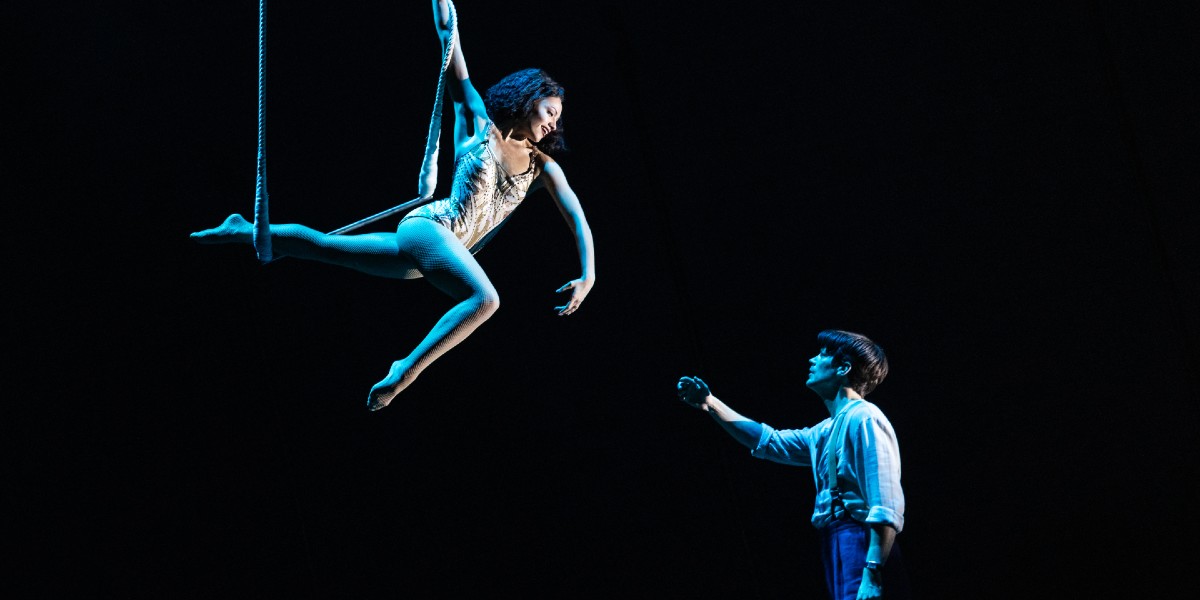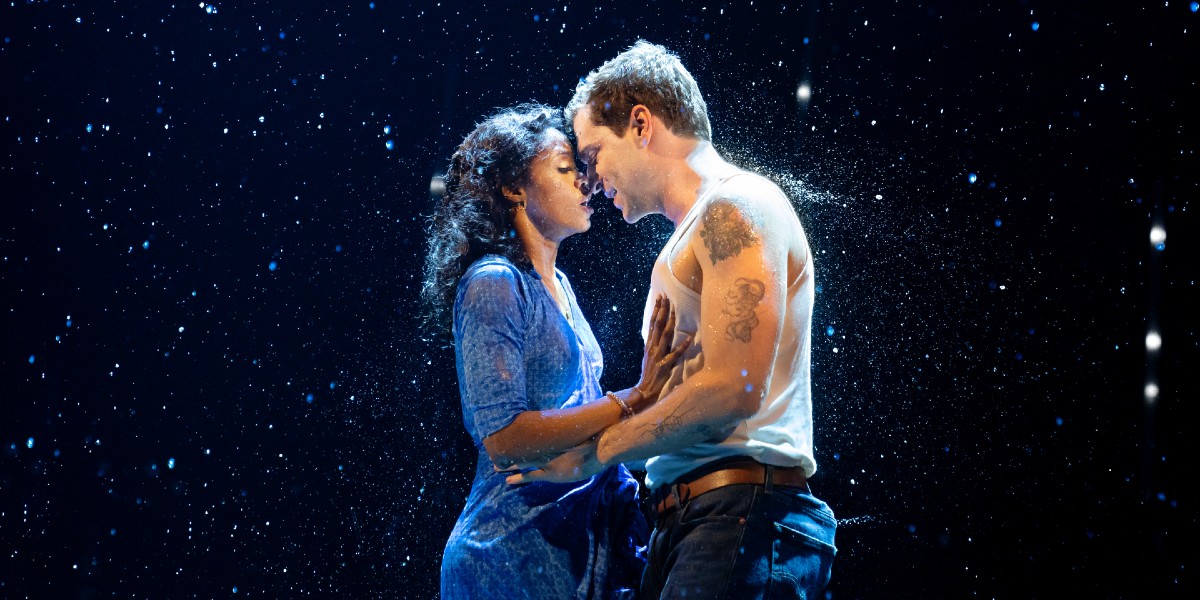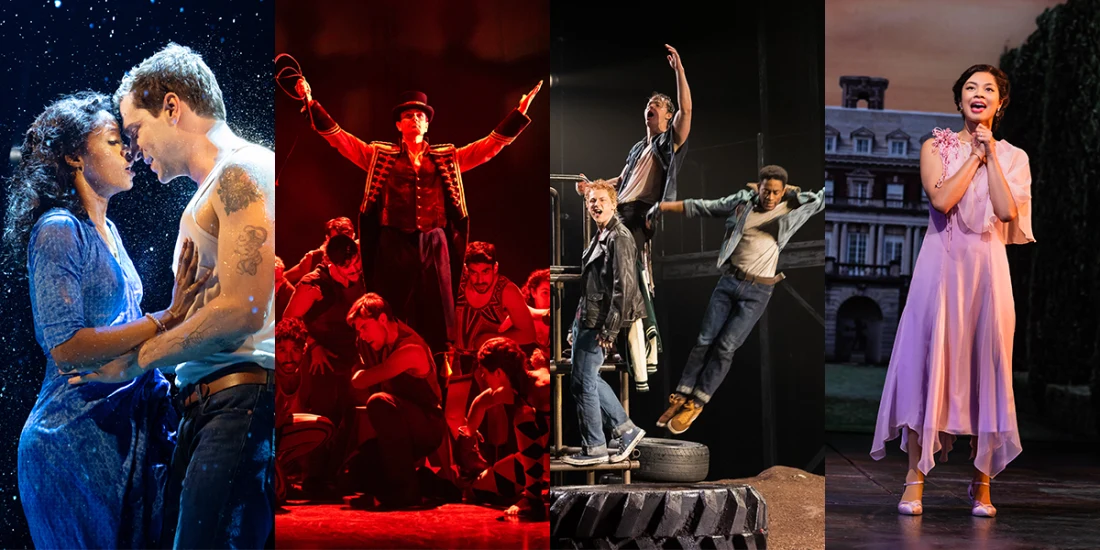From page to stage: How bestselling books became Broadway blockbusters
Find out how the creators of four new musicals — The Notebook, Water for Elephants, The Outsiders, and The Great Gatsby — adapted stories from page to stage.
Read any good books lately? This year's musical theatre writers sure have. The spring season boasts a thrilling literary boom, with four new Broadway shows that began as novels (and then films) before being musicalized: Water for Elephants, The Outsiders, The Great Gatsby, and The Notebook.
Adapting books into musicals isn’t new. The creators of Hamilton, Wicked, Les Miserables, and plenty others all did it. But with four page-to-stage transformations coming out within two months, it's a prime time to dive into the process of making great adaptations.
Turning a novel into a stage show offers a fresh take on material, and it comes with challenges. It’s like translating one language into another — adapters need to reimagine or omit some elements to fit the new medium. Creative license abounds. Writing about circus elephants is one thing, but putting one on stage is a whole other animal.
The Notebook co-director Schele Williams observed that turning a book into a musical is about “distilling it down to its essence. You can read at your leisure. A book could be 1,000 pages long. A musical really wants to be 100 pages long.”
“What are the moments that resonate and continue to propel the story and evoke an emotional response from an audience?” Williams added. “What moments allow this journey to be heightened and exciting and transformational?”
New York Theatre Guide spoke with this spring's creative teams about the book-to-musical transformation process and what readers can expect from their favorite bestsellers on Broadway.

Water for Elephants relies on the power of imagination
Sara Gruen’s 2006 historical romance novel spans over 60 years. It revolves around Jacob Jankowski, a young man orphaned during the Depression who finds refuge in a traveling circus. His life intertwines with the captivating (and married) Marlena and the mistreated elephant Rosie, leading to unexpected alliances and challenges.
“What do you exclude and what do you include if you can’t include everything?” asked Rick Elice, the book writer of the Water for Elephants musical. “That’s the big question, isn’t it?”
The show’s creative team had to decide how to capture the gritty 1930s era and characters in an “extreme state,” said Elice, as they translated the story to the theatre.
“We settled on doing it as a memory play,” he continued. As in the novel, the show unfolds from the perspective of an older Jacob remembering his circus days. The musical depicts some of his memories abstractly through acrobatics, trapeze, and other circus sequences alongside the traditional dialogue and songs. And unlike the 2011 movie starring Robert Pattinson and Reese Witherspoon, which featured actual circus beasts, the musical takes a puppet-forward approach.
“We could sketch in certain parts and then define very, very clearly certain parts and let the audience interact with the story with their imagination,” Elice said. “I like the theatre because the theatre says, ‘Here’s some information, and you can fill in the rest.’”

The Outsiders timelessly captures adolescence
S. E. Hinton’s 1967 novel and the 1983 movie directed by Francis Ford Coppola explores friendship, identity, and the impact of socioeconomic differences in the lives of teenagers regarded as misfits and hoodlums.
Like many people, the musical’s co-writers, Adam Rapp and Justin Levine, read the book in school. “What struck me the most was that these kids’ background was so different from my own, and yet it all felt so relatable,” said Levine, who also co-wrote the music and lyrics.
Adapting The Outsiders, Levine added, was “a really exciting puzzle.”
For Rapp, the transformation was all about capturing “all the extremes that go along with being an adolescent, whether it's 2024 or 1967,” he said. He strove to make the musical as “brutal as it is tender, as violent and bitter as it is sweet.”
Characters’ states of confusion and gummed-up emotions come out in songs. These boys don't always know how to say what they're thinking, so the musical format lets them sing it instead. “I think of music in a musical as a metaphor,” said Levine. “This music is a superpower for these kids.”
Get The Outsiders tickets now.

The Great Gatsby soars right off the page in song
F. Scott Fitzgerald’s classic 1925 novel set in the Jazz Era has spawned films starring Robert Redford and Leonardo DeCaprio. The plot spins around billionaire Jay Gatsby’s unrequited love for Daisy Buchanan, exploring wealth, excess, and the elusive American Dream.
While the book is narrated by Gatsby's friend, Nick Carraway, the musical relieves Nick of that chore. “Once we knew the story was not going to be told specifically through Nick’s perspective, we knew it would allow opportunities to see other characters, specifically female characters,” said lyricist Nathan Tysen. For example, “We had an opportunity to meet and really fall in love with [Daisy's friend] Jordan Baker.”
Choosing moments from the book to musicalize was a challenge. “Fitzgerald's prose is astonishing, and it's poetry, but it doesn't necessarily mean that it sings,” said Tysen. “I don't think anyone wants to hear someone sing the words ‘orgastic future.’ But we do want to hear it.” (Yes, the phrase appears in the script.)
Tysen said the rhythm of Fitzgerald’s dialogue lent itself to being transformed into lyrics. “One of the first songs we wrote was ‘Beautiful Little Fool,’” he said. Daisy says that famous line in the novel while reflecting on her wealthy yet empty life.
“If you read that passage from the book, the song lyrics are almost verbatim; I just moved a couple things around," Tysen said. "It’s such beautiful prose, and it felt like a song.”
The moment occurs early in the novel, but the show’s creators found a different place for it in the musical. It’s Daisy’s “big 11 o’clock number,” said Tysen. “We wanted to have a bigger journey for Daisy.”
Get The Great Gatsby tickets now.

The Notebook spotlights a major life decision
Nicholas Sparks’s poignant love story first became a 2004 film starring Ryan Gosling and Rachel McAdams. As in those iterations, the musical unfolds as lovers Noah and Allie, separated by societal differences, reconnect years later. They face trials, but their deep connection prevails through memories documented in a notebook.
Noah tells the story in the novel, so he looms large. The musical's book writer, Bekah Brunstetter, and songwriter, Ingrid Michaelson, saw to it that Allie’s role grew. Three actors each play Allie and Noah in three different chapters of their lives, and they regularly overlap on stage.
“We’ve always, from the beginning, cared a lot about Allie and a lot about her agency,” said Brunstetter, adding that they’re “telling a story about a woman who is asking big questions… It’s not just about what dude she’s going to be with. It’s bigger than that, and we’ve really tried to expand on that.”
Michaelson, an indie singer/songwriter, echoed that sentiment. “This is a life she’s choosing,” she said. “It's not a relationship she's choosing.”
In the book and film, key moments – a kiss in a downpour, a frolic in a bird-filled lake – stir up emotions. In the show, the music works hardest to muster emotions and make you swoon.
“Love is conveyed through melody, almost more than it is through words,” said Michaelson. “I start with melody. I don't start with lyrics. A piece of music without words can make me cry... There’s no one telling me what to feel. That’s love.”
Gillian Russo contributed reporting to this story.
Photo credit: The Notebook, Water for Elephants, The Outsiders, and The Great Gatsby. (Photos by Julieta Cervantes, Matthew Murphy, Rich Soublet II, and Evan Zimmerman)
Originally published on




